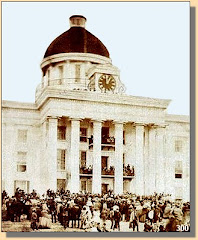
The 1824 “American System” speech by Speaker Henry Clay of Kentucky**
March 30, 1824 – March 31, 1824
On this date, Speaker Henry Clay of Kentucky addressed the House from the well to support targeted protective tariffs and to proclaim his ideal of an “American system” of national development that would benefit all sections of the United States. Clay’s speech distilled his long evolving belief in tariffs to protect fledgling American industry—one component of the American system that sought to promote federally-funded internal improvements and to institute a strong national bank. The speech befitted the reputation of a man widely accepted as one of Congress’ greatest orators. Armed with visual charts, Clay delivered an address that filled two legislative days and more than 40 pages of print in the Annals of Congress. “The object of the bill under consideration is to create this home market, and to lay the foundations of a genuine American policy,” Clay began. He then addressed 10 main objections to weak tariff provisions. “Are we doomed to behold our industry languish and decay yet more and more?” Clay intoned. “But there is a remedy, and that remedy consists in modifying our foreign policy, and in adopting a genuine AMERICAN SYSTEM. We must naturalize the arts in our country, and we must naturalize them by the only means which the wisdom of nations has yet discovered to be effectual—by adequate protection against the otherwise overwhelming influence of foreigners.” The speech garnered national accolades. The Tariff of 1824 passed the House by a narrow margin—with support from the northwest and Middle Atlantic and strong opposition from the South. It carried the Senate narrowly and was signed into law in May 1824.
**Taken from the Office of the Clerk of the House of Representatives




